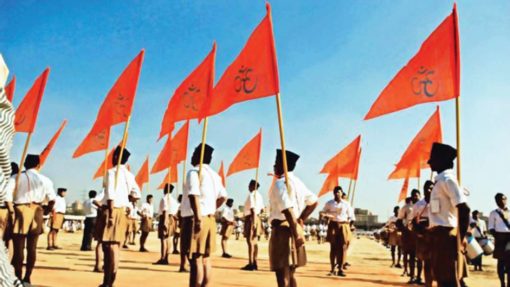
Rashtrasant Tukadoji Maharaj Nagpur University’s decision to include the Rashtriya Swayamsevak Sangh’s role in nation building in the undergraduate syllabus has not gone well with historians, academicians and even the students. Interestingly, the chapter is included in the pre-independence history section. Academicians and historians see it as a move to saffronise the syllabus, while the students are demanding its immediate removal.
Meanwhile, university officials claim that they have added history of organisations that were working for different sections including cultural or social growth. They added that the RSS’s history has been included as a cultural organisation and not political.
The updated syllabus for the Bachelors of Arts (BA) History second year for 2019-20 has also appeared on the university’s website. The new chapter ‘Role of Rashtriya Sayamsevak Sangh for Nation Building’ has been included in the third unit of the paper History of India: 1885-1947 which is part of the fourth semester.
The chapter has replaced another one on the Communist Movement, its rise and its role.
Historians have pointed out that the RSS, which was founded in 1925, had not participated in the independence movement of India. In fact, it opposed the Indian Constitution and the secular values enshrined in it. Keeping in view the RSS’s history, it is misleading to include it in the unit on pre-independence history and that too under the title ‘Nation Building’ according to the historians.
Shrimant Kokate, a historian from Pune, said, “The Constitution of India talks about nationalism that is based on equality, justice, secularism, liberty and fraternity. However, the RSS’s nationalism does not accept our Constitution or the values inscribed in it. The Sangh aims to create a Hindu Rashtra. Since the Bharatiya Janata Party has come to power in Maharashtra and at the Centre, it has been trying to change the syllabus of universities. This change in syllabus is part of their attempt to spread their values among the youth, to realise the RSS’s idea of creating a Hindu Rashtra.”
He added, “There are proofs that RSS never participated in the independence movement. How can it become a part of History of India? If this continues to happen, India will become a nation like Nazi Germany or Syria or Afaganistan. Efforts should be made to stop it.”
Amit Hatwar, secretary of the Students’ Federation of India (SFI), Nagpur region, said that the students will soon begin protest demanding that the topic be removed from the syllabus.
Another student, Abhishek Singh Vardhan, vice president of the National Students’ Union of India (NSUI) said that the inclusion of the said chapter in itself is unconstitutional. He said, “Organising shakhas (RSS camps) and breeding an ideology in a shakha is different as that is a matter of personal choice. However, considering the fact that the ruling party in the state and Centre align with the RSS’s ideology, including the history of the same can be taken as part of their systematic plan to forcibly preach their ideology. The inclusion of the chapter in the syllabus not only curbs the students freedom of choice, but is also an attempt to influence the young voters. This should be immediately stopped to safeguard the democratic rights of the students.”
Dr Shyamrao Koreti, chairman of the Board of Studies (that has changed the syllabus) and head of Humanities said, “This chapter was being taught to MA second year students for the last 17 years under History of Vidarbha section. History of Dikshabhumi, Tapobhumi and other organisations were also part of the syllabus. After the inclusion of new members in the Board of Studies, we decided to update the syllabus as we found some issues with the earlier one.”
He added, “We have tried to include information of all organisations working for the society including culture, dalit rights and so on till 1945. These organisations are not necessarily political or those who fought for the country’s independence. The RSS’s history has been included for the organisation’s cultural and social contribution towards nation building. We have also added a section on the Indian National Congress but no one is talking about that.”




